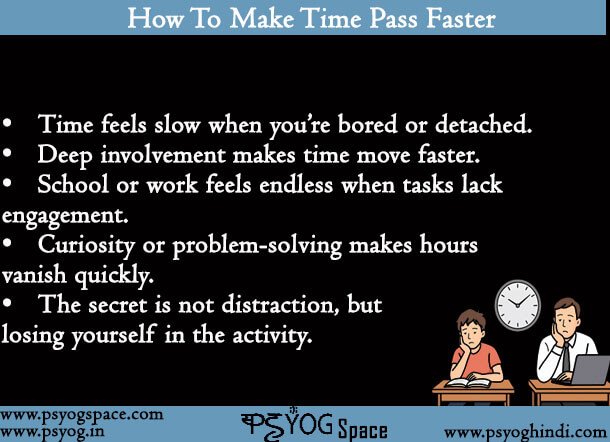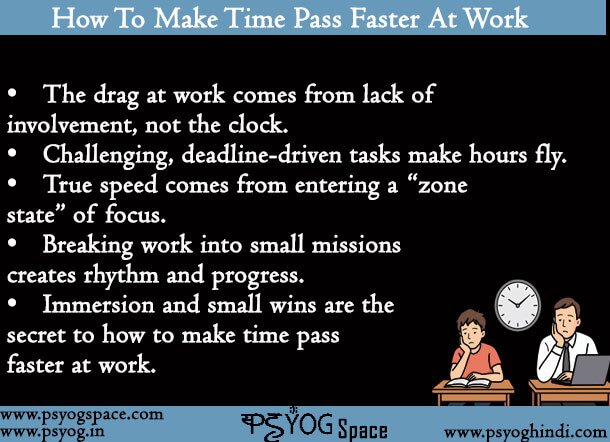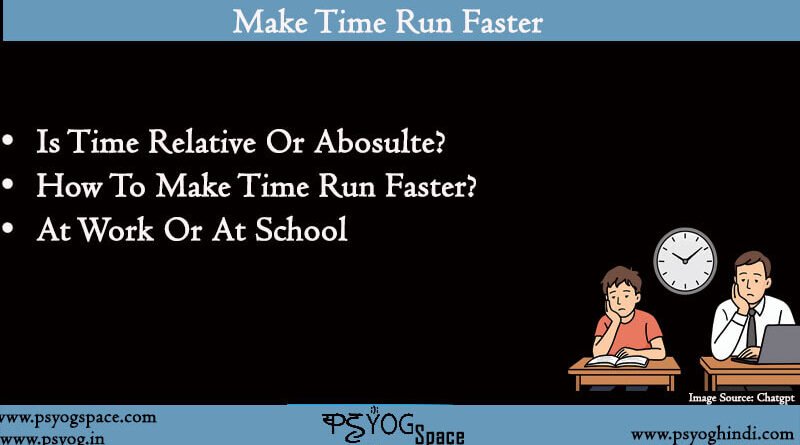How To Make Time Pass Faster At School: At Work, Mystery Of Time
People complain about time dragging all the time. You hear it at school, in the middle of a long lecture, you hear it at work when people keep staring at the clock. The funny thing is, you also hear the opposite — “wow, that day just flew by.” So how to make time pass faster at school? How to make time pass faster at work? People keep searching for little tricks, but the real mystery of time is more interesting than those “top ten hacks” you read online. Time is strange. When we are doing something, it stretches like rubber, and with some other activity it collapses into nothing. And a lot of it depends on what’s going on inside you, not on the clock itself.
How To Make Time Pass Faster
We are sure that you must have heard this several times: “time flies when you’re having fun.” It is one of those daily happenings that we don’t pay attention to it; however, this holds a deep mystery. Honestly, if you really want to know how to make time pass faster, don’t just think about scrolling through phone, or listening to music. Think about involvement. When you’re miserable, bored, detached, you watch every second crawl. But the moment you actually get into something, time loses its weight.
Take school or office life. A boring math lecture? Feels endless. But if you suddenly get curious about a single problem, or you’re debating an idea with someone, the period is over before you know it. At work, a dull spreadsheet can feel eternal, but if you’re problemsolving with urgency, suddenly the day evaporates. That’s the pattern. The real way how to make time pass faster is not by distracting yourself but by losing yourself in what’s right in front of you.

How To Make Time Pass Faster At School
Now let’s go directly to the situation most people ask about: how to make time pass faster at school. Every student knows that feeling — staring at the wall clock above the blackboard, watching the second hand move so slowly it feels broken. It’s torture. But here’s the odd twist: that painful slowness is not about the clock, it’s about your attention.
When you’re totally bored in class, your mind is halfpresent, halfwandering. You’re split, and that split makes every moment heavier. But think about times when you were in a group project, actually caring about the outcome. The whole class vanished, didn’t it? Or when you’re playing a sport in school, suddenly hours fly by. That’s the clue. How to make time pass faster at school is not about escaping the class, but about diving in so much that you stop noticing yourself. Lose yourself in the
work — even if it’s math, even if it’s history. If you can hook onto one thing that draws you in, time will bend.
And don’t underestimate small adjustments. Taking better notes, asking one question, engaging a little bit — those are not just “study tips.” They’re time hacks. Because the more you’re in it, the less you count minutes. That’s the real solution to how to make time pass faster at school.

How To Make Time Pass Faster At Work
Work is no different. People love to joke about the “9 to 5 grind,” the endless drag. It’s why coffee breaks exist, why people stare at the clock around 3 p.m. But once again, the core problem isn’t the clock. It’s involvement. If you want to figure out how to make time pass faster at work, don’t just scroll your phone or gossip near the water cooler — that only kills five minutes and then you’re back to misery.
Think about days when you actually had a challenging task. Maybe you had a deadline and you were stressed, but you were focused. Those days actually felt faster, didn’t they? You looked up and it was already evening. That’s what happens when you’re absorbed. If you want to really learn how to make time pass faster at work, you need to change your perception: instead of trying to escape the work, plunge into it. Find rhythm. Get into what some athletes call the “zone state.” When you hit that, hours dissolve.
And if that feels too idealistic, even breaking your work into minimissions can help. Instead of having a huge goal, focus on small one’s and enjoy accomplishing those. You will realize that your day would not only become smoother, but you will be involved in your work. And the best part is, each such small accomplishment would make the click tick faster for you. That’s the hidden way how to make time pass faster at work.
Also Read:

Conclusion
So what do we make of what we learnt? Time is always constant; however, it can change for us depending on our outlook. You asked how to make time pass faster at school, how to make time pass faster at work, or just how to make time pass faster in general. The answer was never about tricks, it’s about involvement. The more present you are, the more you forget yourself, the more time slips. That’s why parties feel short and boredom feels eternal. Time is a mirror of your attention. Shift the way you show up, and the mystery of time bends with you.
FAQs
Passing time in school feels hard only when you’re detached. The fastest way is to find small ways to involve yourself. Ask the teacher a question, challenge a friend with a concept, or even just get absorbed in neat notetaking. The more you throw yourself in, the more invisible the minutes become. Scrolling your phone might trick you for a moment, but it doesn’t dissolve time the same way that actual involvement does. Once you’re really in the lesson or an activity, the class period feels lighter and shorter.
A typical 9-5 feels endless if you’re staring at the clock every hour. The best deal is to cut down activities into smaller ones, and focus on them. Once you will be involved with these small tasks, time naturally will pass away quickly. And if you ever manage to hit a flow state with your work, even once in a while, the whole day shrinks. That’s why deadlines sometimes make days feel fast — you’re fully engaged. So the key is to engage, not to escape.
The fastest way to pass time, whether at school, at work, or anywhere, is to forget yourself in the process of doing something. When you’re bored, every tick is heavy because you’re watching yourself wait. But the moment you’re immersed — in a book, in conversation, in a project — hours vanish. It’s not about killing time, it’s about losing track of it. The more absorbed you are, the quicker it passes, whether you’re in a classroom, at the office, or even just sitting at home.

